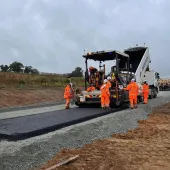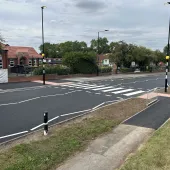LGA calls on Government for more investment in road repairs

Councils calling for greater slice of existing fuel duty to combat soaring road repairs backlog
THE amount of time it would take to fix the nation’s roads has soared by almost a third in a decade, councils warn. The Local Government Association (LGA), which represents more than 370 councils in England and Wales, highlights how it would now take 14 years just to clear the backlog of road repairs – a figure that has surged from an estimated 10.9 years in 2006.
Councils fix almost 2 million potholes a year (an average of 12,000 potholes for each local authority), yet the average English authority faces a £69 million estimated one-time cost to bring its roads up to a reasonable condition. It would now cost almost £12 billion to bring roads up to scratch, according to the latest figures from the Asphalt Industry Alliance’s ALARM survey.
To reverse this trend, the LGA is calling, in its Autumn Statement submission, for the Government to inject a further £1 billion a year into road maintenance. This, it says, could be achieved by investing just 2p per litre of existing fuel duty. It stressed this should not be paid for by increasing fuel duty rates.
Previous LGA polling shows that 83% of the population would support a small amount of the existing billions they pay the Treasury each year in fuel duty being reinvested to help councils bring roads up to scratch. This would help tackle the damage done to the road network by recent harsh winters and decades of underfunding by successive governments, which has seen the national backlog of road repairs spiral.
The LGA points out that over the remaining years of the decade the Government will invest more than £1.1 million per mile in maintaining national roads that make up just 3% of England’s total road network. This level of investment contrasts starkly with the £27,000 per mile investment in maintaining local roads, which are controlled by councils and make up 97% of the road network.
This gulf in funding puts the country’s businesses at a competitive disadvantage and provides poor value for money, argues the LGA. It says virtually every ‘national’ journey starts and ends locally, which means the road network is not working for people in their corner of the country.
Councillor Martin Tett, the LGA’s transport spokesman, said: ‘It is becoming increasingly urgent to address the roads crisis we face as a nation. Our roads are deteriorating fast and it would take almost £12 billion, and could be nearly 2030, before we could bring them up to scratch and clear the current road repairs backlog.
‘Councils fixed a pothole every 15 seconds again last year despite significant budget reductions leaving them with less to spend on fixing our crumbling roads. Local authorities are proving remarkably efficient in how they use this diminishing funding pot but they remain trapped in a frustrating cycle that will only ever leave them able to patch up our deteriorating roads.
‘Councils share the frustration of motorists having to pay to drive on roads that are often inadequate. Our previous polling has shown that 83% of the population would support a small amount of the existing billions they pay the Treasury each year in fuel duty being reinvested to help councils bring our roads up to scratch.
‘Our roads crisis is only going to get worse unless we address it as a national priority as part of the Autumn Statement. The Government’s own traffic projections predict a potential increase in local traffic of up to 55% by 2040. Councils desperately need long-term and consistent funding to invest in the resurfacing projects that our road network needs over the next decade.
‘Motorists pay billions to the Treasury each year in fuel duty when they fill up their car at the pumps, only to then have to drive on roads that are decaying after decades of underfunding. They deserve roads fit for the 21st century.’
Supporting the LGA in calling for greater funding, Alan Mackenzie, chairman of the Asphalt Industry Alliance, said: ‘The link between infrastructure investment and economic growth is well established but long-term underfunding means that the local road network continues to deteriorate at a faster rate than it can be repaired.
‘Ten years ago, our ALARM survey warned against putting off the investment needed today until tomorrow. Local authority highways engineers told us then that it would take 10.9 years to get their roads back into a reasonable condition. This year they told us the backlog was 14 years.
‘The age of the network and the increased volume and weight of vehicles – not to mention the effect of wetter winters – threatens the resilience our roads. Unless action is taken, we face the real prospect of a local road network that is not fit for purpose.’









